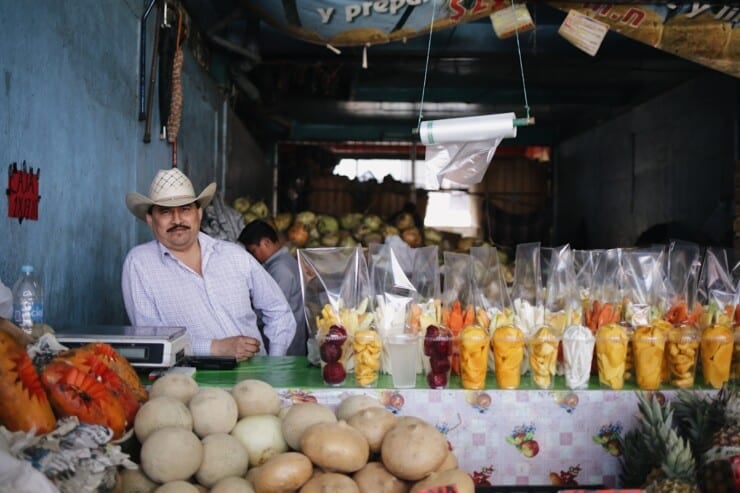Fellow food friend, author, and world traveler, Heather Christo, was diagnosed with a handful of allergies a few years ago and has since mastered traveling with food allergies.
We’ve got major respect because, instead of having it drag her down, it’s only made her more creative in the kitchen and on the road.
We asked her to share her hard-earned tips traveling with food allergies and still eating well.
Heather Christo On Traveling With Food Allergies
Traveling has always been an important part of my life. My husband and I travel a lot for work, and we make it a priority to take our girls along with and travel as a family whenever possible.
When my daughters and I were diagnosed with a slew of food allergies a couple of years ago, I actually stayed up at night worrying about how we’d see the world without putting our health at risk.
In the last few years, I’ve learned how to overcome the challenges of traveling—both domestically and internationally—while still keeping our diet on track.

Tips For Traveling With Food Allergies
Here are my top tips for traveling with food allergies:
Traveling On A Plane
I fly a handful of times a month, so staying allergy-free at the airport is always on my mind. I have an extensive list of allergies as in there is almost nothing I can eat on an airplane (except, ironically, the peanuts). I also fly often with my children and there is nothing like being trapped on a plane for hours with low blood sugar!
The good news is that there are a lot more allergy-friendly choices at the airport these days. At my home airport of Seattle, I go with sushi (there is a reputable place!). Other cities, I’ll opt for pre-packaged salads (less chance of cross contamination), and, at the very least, I can usually find hummus and fresh veggies. Even so, you have to be careful because cross contamination happens, so the airport is always a bit of a gamble. Which leads me to….
Packing Allergy-Free Snacks
Whether just for the flight or for the duration of your trip, packing allergy-free snacks is SO important! Personally, I feel you can’t go wrong with whole fruit. True, you can’t always bring fruit on the international flights, but you can eat it in the airport, and it’s pretty much always available.
If you aren’t allergic to nuts, the same applies. Also dried fruit is great—no refrigeration needed and they don’t take up much space.
But most of all, I lean on protein bars. As in I take a stash of them everywhere. Seriously, everywhere. They are in my car, all of my purses, my kids backpacks—where we go, the protein bars go. They’re total snack insurance when you can’t find food that is otherwise safe.
Potato chips are another thing I can lean on for my kids (though, tbh, I never thought I would be say that!) since you can find these pretty much all over the world and they are almost always available. We have eaten a lot of Pringles in the past few years!
Allergies And Hotel
Because we travel so often, I have made a practice of informing our hotel of our allergies before we arrive. They in turn can let room service know, and they tend to be really diligent about helping us navigate menus when we call.
I also often request an additional mini-fridge in the room that is empty so that we can fill it with our own allergy-free snacks and foods. It makes breakfast and in-between meals far more convenient.
Navigating Food Allergies At A Restaurant
If you are making restaurant reservations ahead of time, check the menu then too—it just takes a few minutes and allows you to make choices without making the waiter, well, wait around.
Having said that, definitely tell your waiter about your allergies, and let him or her know that even though you think you know what you can have, their help would be greatly appreciated. Remember, they WANT to help you since the last thing they want is a diner getting sick on their watch.
Food Allergies And International Travel
Between language barriers and differing customs, traveling with food allergies internationally can be more complicated. We spent a summer in Europe after our diagnosis and found that some countries were easier to navigate than others.
Nearly 50% of the UK is now gluten free and food allergies are regularly discussed, so their awareness was better than in the United States.
Greece, on the other hand, was definitely more difficult. The good news with most of the Mediterranean countries is that most everything is cooked in olive oil instead of butter, so as long as you eat clean—grilled meats, fresh salads, potatoes—you can get by.

Last Thoughts About Traveling With Food Allergies
Bottom line is that food allergies shouldn’t keep you from travel or from experiencing new things (and new foods!). You just have to be prepared and strategic about where you’re headed and what you are eating.
Find what works well and continue to refine and improve on it—we are always discovering new tactics, products, and recipes that make things easier. We try to look at it like it is just another part of the adventure!
More Healthy Travel Tips
ISO of more advice for how to be healthier? Check out these articles:
- Candice Kumai Shares Her Top Healthy Travel Tips
- How To Do A Digital Detox
- Healthy Habits From Italy To Adopt ASAP
Have Us Plan Your Next Trip
Looking to travel soon? Our travel planning services are here to help — head here to get started!
Photo Credit: Opening photo by Srdan Kirtic